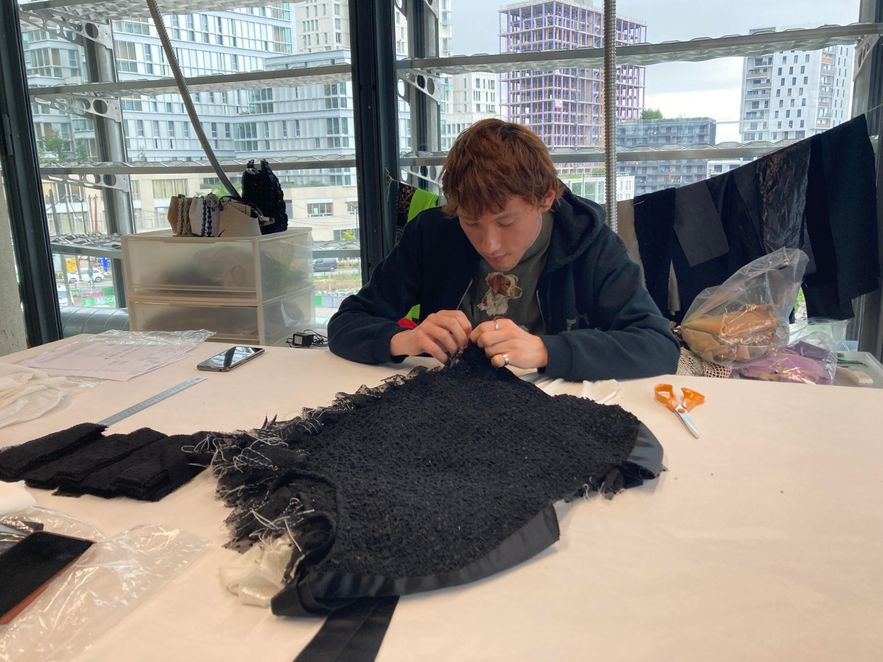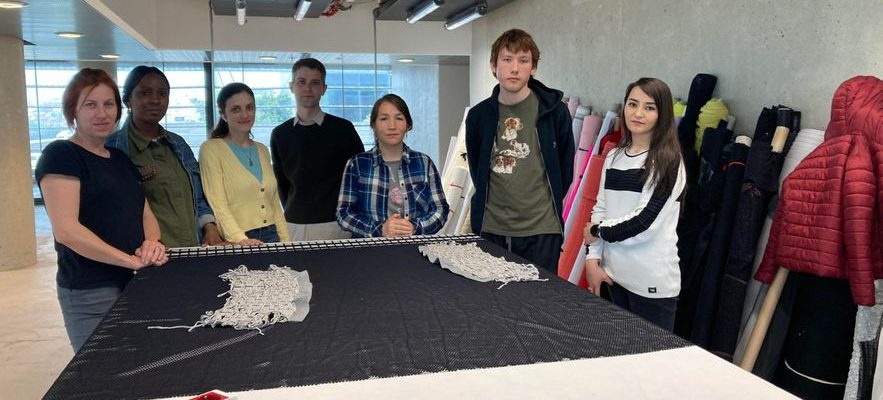Comedians, entrepreneurs, conductors, roofers or even influencers, they are active in the fight against climate change. For L’Express, students from the Institut Pratique du journalisme Paris Dauphine set out to meet small and large players in climate action in France.
“It’s very rewarding to start from nothing and come up with a finished product.” A big smile on her face, which will not leave her all day, Nina assembles ribbons on a T-shirt. A language and literature teacher in college, she left kyiv for France a year ago. This mother of three, brunette with long hair, overflowing with energy, works today on the eco-responsible integration site of Espero France, in the 13th arrondissement of Paris.
She sews, she spins, she cuts… Since March, Nina has been training in “upcycling” sewing, made from recycled clothing and fabrics. “I would like to create a dress with my drawings on it,” she explains in still hesitant French, before handing us a bag decorated by her, painted with a huge pink flower with white highlights.
Like her, fifteen other refugees benefit from the system of the First Hours, financed by the town hall of Paris and set up by Espero. “We train people who are far from employment, have never been to school, beneficiaries of the RSA… And who have skills to be valued”, explains Maya Persaud, founder of Espero France. Foreigners but also French people, paid at minimum wage, are thus introduced to the requirements of European fashion. All hope to find a stable position in a haute couture house, join independent companies or set up their own project.
Since February, apprentices from the Espero France association have been working on making recycled fabrics in their new premises at the Berlier factory in the 13th arrondissement of Paris.
© / L’Express/IPJ/Emilie Barthe
While waiting for Dior or Channel, the refugees trained by Espero France are preparing to welcome the mayor of Paris, who is inaugurating their new premises in the 13th arrondissement this Thursday. Anne Hidalgo will leave the Berlier factory, a space that brings together many eco-responsible fashion companies, with a gift specially made by the teams from the various structures: a floral pocket for her computer.
“We want to help people in a precarious situation to find long-term employment, while training in economic and environmental issues”, explains Maya Persaud, with a watchful eye on the new collection in preparation. In 2016, the forties became aware of the extent of the refugee crisis and imagined a way to enhance their skills: she then created Espero France. The association saw its first hours by training these people in beekeeping, then quickly opened up to permaculture.
But the young fashion enthusiast does not stop there. In 2021, for a professional project in fashion, Maya Persaud is looking for designers and has the idea of finding these skills in refugee aid associations and in accommodation centres. “We toured different support structures for people in precarious situations and found around thirty talents,” she says. The click to set up your “upcycling” training.
“Another dimension of fashion, which makes more sense”
Four sewing machines later and with the help of a trainer friend, the workshop comes to life in Anthony, near Paris. Nina and her colleagues collaborated there with several major ready-to-wear brands. They recently had the opportunity to dress supermodel Cindy Bruna for her stair climb at the 2023 Cannes Film Festival, in an off-white playsuit.
On another table, little hands are busy making a unique fabric. It is a fillet graciously donated by the Balmain company that the team reworks in its own way. This is the hallmark of the association: recovering raw materials from haute couture houses to make unique pieces. “It’s another dimension of fashion, which makes more sense,” says Florian Brun-Buisson, couture technical supervisor. He accompanies the apprentices in the creation of the fabrics, which are then sent to Anthony for the making of the pieces.
“Today, it no longer makes much sense to manufacture part of the production in the four corners of the planet, especially for young people. They will no longer buy parts made in China or even in Bulgaria”, adds the couturier, who notes that the big houses are relocating their production to France to stick to environmental requirements.
“Refugees have a know-how that they think they cannot use in France”
However, haute couture houses need manpower. “That’s why we’re here! We have qualified people, some of whom learned to sew from an early age,” says Florian Brun-Buisson. This is the case of Soraya. A volunteer for two months on the integration site, the young woman used to make dresses, scarves, plaids in her country, Afghanistan. She fled the Taliban earlier this year with her husband. “My mother taught me to sew and do embroidery when I was little,” Soraya explains in English, showing images of her creations on her phone, dresses in bright colors and gold embroidery. “But it’s different from what we do here,” she adds between two scissors.
“You know, what you do, in France, you need years of study to do it”, adds Florian Brun-Buisson immediately in front of Soraya, embarrassed by the compliment. The young man remembers one of the former beneficiaries, a rare person who knows how to embroider using a traditional machine. Today, he is employed on a fixed-term contract in one of Chanel’s workshops.
“All of them have a know-how which they think they cannot use in France. It would be a shame if they started from scratch!”, Says the supervisor.
A new collection presented in June
A little further in the workshop, Kostya is concentrating on spinning the fabric for the new collection. Reserved, the young Ukrainian, who studies French at the Sorbonne, prefers to let Nina speak for him. He is a model, in Ukraine as in France, explains the mother of the family with her words. Armed with her phone, she reveals a photo of the young man wearing the latest Espero collection during a fashion show last April. Kostya, who until then agreed with Nina’s assertions, ended up raising his head from his work to tell us about his desire to join the Duperré higher school of applied arts.

Kostya finishes one of the pieces from the new UNITED FORMS collection.
© / L’Express/IPJ/Emilie Barthe
For Nina, he has all the qualities required. The Ukrainian goes back in her photos and stops on one of them. We see a large textile spread out on a table. Transformed into a dress, it will integrate the new Espero collection: United Forms.
In collaboration with Italian designer Serena Cancellier, the pieces will be presented during a fashion show in June, on the occasion of International Refugee Day.
